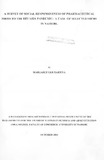| dc.contributor.author | Rarieya, Margaret Ger | |
| dc.date.accessioned | 2013-05-08T09:23:36Z | |
| dc.date.available | 2013-05-08T09:23:36Z | |
| dc.date.issued | 2001 | |
| dc.identifier.citation | A management research project in partial fulfillment of the requirements for the award of masters in business and administration (mba) degree, faculty of commerce, University of Nairobi. | en |
| dc.identifier.uri | http://erepository.uonbi.ac.ke:8080/xmlui/handle/123456789/20214 | |
| dc.description.abstract | The concept of social responsiveness has gathered momentum and is becoming an increasingly potential force in both developed and third world economies for all those businesses that seek growth, survival and good reputation. Fundamental changes are
taking place in people's attitudes and greater emphasis is being placed on human values, individual worth and the qualitative aspects of life in the society.
In the Kenyan economy like in other countries there has been public demands that ARVs and other medications used in managing opportunistic infections associated with a weakened immunity, should be made affordable to the general population. Increasingly, the pharmaceutical firms have come under criticism relating to the pricing of essential medications.
This survey was conducted on 49 pharmaceutical firms based in Nairobi. It sought to answer four questions in relation to the pharmaceutical's industry's input in the
Kenyan society as far as the HIV IAIDS pandemic is concerned. First it sought to
determine the current initiatives that the Nairobi firms are undertaking in helping society cope with the HIV IAIDS crisis. Secondly it sought to determine the attitudes of managers towards the arguments for and against the business social responsiveness with respect to HIV/AIDS. Third it sought to determine the factors that favor firms involvement in assisting society deal with HIV IAIDS and fourth it attempted to ascertain the obstacles that impede the firms involvement and implementation of the programs.
The population of interest included all pharmaceutical firms in Nairobi. The
.....
information sought in the study was collected using a structured questionnaire and
personal interviews. Twenty managers from the various firms completed the
~
questionnaires and four key players in the industry were interviewed.
The study revealed that the firms preferred to target healthcare professions and to a lesser extent charitable organizations as opposed to direct contact with general members of society or the sick people. The initiatives most commonly used were holding
continuing medical education meetings with healthcare professionals, setting special pricing to the medications frequently used by ijamunocompromised patients and sponsoring healthcare professionals education.
Positive company image as well as company policy and availability of funds were the biggest contributing factors while resource constraints, lack of policies as well as
Vll
over-reliance on headquarters directives (in the case of multinational firms and importing distributors) were felt to be the strongest obstacles the firm managers encountered.
The survey also brought out the fact that the multinational pharmaceutical firms in Nairobi were the most involved in assisting society cope with the HIV /AIDS epidemic as compared to the local firms and importing distributors. It was however clear that in a vast majority of the firms studied, economic considerations still dominate management
thinking. | en |
| dc.language.iso | en | en |
| dc.title | A survey of social responsiveness of pharmaceutical firms to the hiv/aids pandemic: a case of selected firms in Nairobi. | en |
| dc.type | Thesis | en |
| local.publisher | Department of Business Administration | en |

